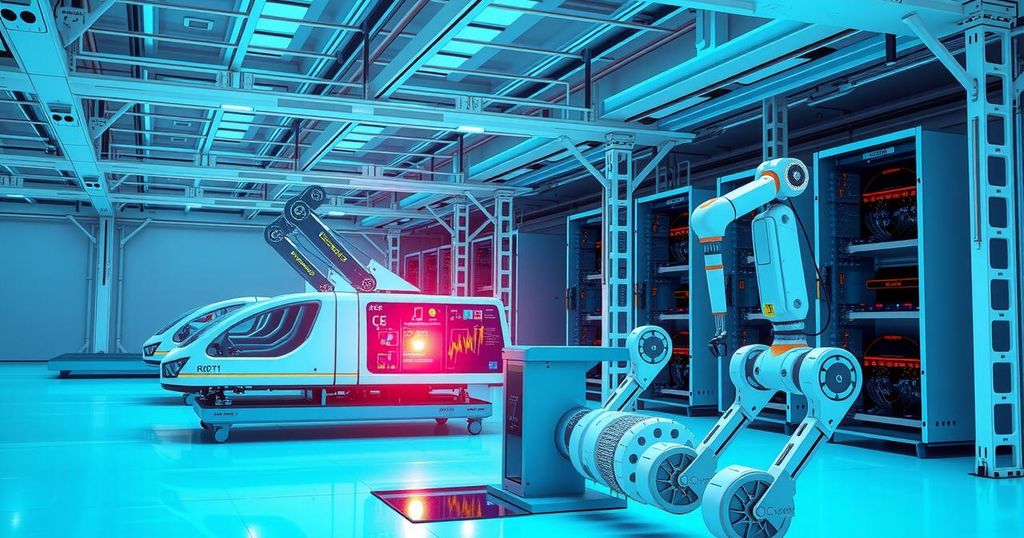Germany Partners with NVIDIA to Lead Europe’s AI Manufacturing Race
Germany collaborates with NVIDIA to develop Europe’s first industrial AI cloud, aiming to reshape manufacturing. This partnership is poised to enhance technological sovereignty, provide resources to smaller businesses, and supports a broader plan for an AI gigafactory. The project signifies a bold step toward establishing Europe’s own tech independence.
Germany is diving into the deep end of tech innovation, teaming up with NVIDIA to launch Europe’s first industrial AI cloud. The project stands out as potentially the boldest European tech initiative in years. NVIDIA CEO Jensen Huang has been busy making the rounds in Europe, charming audiences from London to Paris, but it was his conversation with German Chancellor Friedrich Merz that could change the game.
This partnership with Deutsche Telekom isn’t just about two companies shaking hands; it’s about reshaping European tech independence. They’re looking to build what they’re calling an “AI factory,” leveraging Germany’s illustrious industrial background to supercharge manufacturing. The aim? Equip European manufacturers with the computing power they need for everything from robotics to product design.
“As we step into the AI age, manufacturers need two factories,” Huang noted. “One for production and another for the intelligence that drives it.” He emphasized how this new infrastructure could set the stage for advanced, AI-powered manufacturing across the region.
This message of urgency was echoed by Telekom’s CEO Timotheus Höttges, who stressed that Europe needs to act fast in securing its technological future. “We have to sprint, not stroll,” he said, insisting that the time to embrace AI is now, or risk falling behind in the global tech race.
In the first phase alone, they’re set to roll out 10,000 NVIDIA Blackwell GPUs, making this the largest AI deployment in Germany’s history. This commitment suggests the country is ready to take a competitive stand on the global stage instead of merely watching from the sidelines.
A Deloitte study recently underscored the pressing need for tech development to maintain Germany’s competitiveness, notably stressing the urgency of expanding data center capacities. As demand for AI infrastructure is expected to surge in the coming years, investing now appears essential rather than optional.
One of the first beneficiaries of this AI power is NEURA Robotics, a firm specializing in cognitive robotics. They’re developing a platform called Neuraverse, which enables robots to learn from each other in real time. Think of this as a shared brain where machines enhance their skills in tasks from welding to ironing.
“Physical AI is the electricity of the future,” explained David Reger, Founder and CEO of NEURA Robotics. “Through this initiative, we’re building the infrastructure Europe needs to lead in intelligent robotics.” This project aims not just for efficiency but to completely transform what manufacturing looks like in this intelligent era.
Moreover, there’s an exciting prospect of this innovation spilling over to Germany’s smaller firms—the Mittelstand—which are often the backbone of the economy. Many of these companies lack the resources for AI but have the specialized know-how, making them ripe for AI advancements. Providing them access to this technology could help maintain their edge in a competitive global market.
Academic institutions are also in line for this technological boost, possibly speeding up innovations across various domains. The 900 startups in NVIDIA’s Inception program in Germany stand to gain significantly, potentially igniting a wave of entrepreneurial activity.
Although this project is impressive, it’s seen as a stepping stone toward a larger ambition: the upcoming AI gigafactory set for 2027. Supported by both the EU and Germany, this initiative aims to power it with 100,000 GPUs, showcasing Europe’s commitment to carving its own path in the tech landscape. As other European telecom companies launch similar AI efforts, there’s a growing momentum for a collective push toward technological autonomy.
Now more than ever, Europe is determined not to just consume AI technologies developed elsewhere but to create its own capabilities. Whether this ambitious project in Germany succeeds remains to be seen, yet it’s clear: the continent is ready to take its place on the map of global innovation.
In summary, the partnership between NVIDIA and Germany is positioning Europe at the forefront of AI manufacturing. As they roll out this ambitious project, there’s hope not just for tech giants but for small and medium-sized companies too. The step towards building an AI gigafactory underscores Europe’s aspiration for independence in technology. This is a pivotal moment—Germany is eager to claim its stake in the future of AI, moving from consumer to creator.
Original Source: www.artificialintelligence-news.com




Post Comment